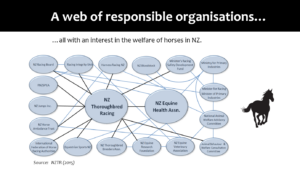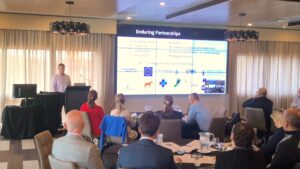Joining forces to improve animal care
Martin Burns grew up riding farm bikes rather than horses so when he took on a leading animal welfare role in New Zealand racing, he searched for experts with the credentials he was missing.
As Welfare and Sustainability General Manager at New Zealand Thoroughbred Racing, Martin set out to build partnerships and collect knowledge, leading to a clearer view of welfare issues and opportunities than the racing authority could achieve alone.
Speaking at the Racing and Wagering WA forums on greyhound and racehorse welfare this week, he described his experience in connecting people to make important advances.
“Although I held overall responsibility for thoroughbred welfare in New Zealand racing, I’m completely unqualified on paper,” Martin said.
“I’m not a vet or animal scientist, I merely have a practical upbringing of animal husbandry on our family sheep farm.
“My riding background was mostly farm bikes. Any horse riding was on neighbours’ farm hacks and a canter was a very nervous experience.
“I became good at what I did, not through my own knowledge but through collaboration with people from other fields and organisations with a shared objective – the welfare of horses.
“I collaborated with anyone I could find and, in 2015, my list of organisations with a common interest in horse welfare turned into a spider’s web of relationships.”

Martin said the organisations were united in wanting positive welfare outcomes but each had different viewpoints, information, priorities and influence.
Respecting those differences was vital while discovering areas of agreement to achieve mutually endorsed goals.
“Since I lacked technical expertise for planning our strategies or initiatives, I had to find common ground and start conversations which yielded important perspectives and opened doors to knowledge and influence,” Martin said.
“I think, perhaps, my lack of background was an advantage since I was unafraid to ask questions and kept my mind open to suggestions.
“In the case of New Zealand Thoroughbred Racing, a small organisation was able to partner with others such as equestrian sports, research groups and government to make advances it couldn’t do alone.
“Collaboration makes everyone’s job easier.”

Martin Burns
In New Zealand, legislation in 2013 recognised animals as sentient, meaning people caring for them needed to recognise animals have awareness and feelings which matter to them.
“For the racing community, this isn’t a great leap,” Martin said.
“Due to their expressiveness, we have long understood horses have feelings and perceptions and we’re also competent in reading and talking about our horse’s mood or expression of emotion.”
The science behind the racing authority’s approach was based on the Five Domains Model of Animal Welfare, which enables evaluation of animals’ experience. The domains are:
- Health: Healthy and fit, injuries appropriately treated.
- Behaviour: Able to express natural and rewarding behaviours.
- Nutrition: Enough water and food. Balanced and varied diet.
- Environmental: Comfortable and pleasant physical environment.
- Mental state: Social contact with other animals and close bonds between horse and human.
From 2016 to 2019, New Zealand Thoroughbred Racing collaborated with the author Professor David Mellor along with a group of vets, trainers and breeders to adapt the welfare model specifically for thoroughbred horses.
It was published in 2019 and has since been adopted by the International Federation of Horseracing Authorities, and other thoroughbred or standardbred racing jurisdictions.
“The goal of all this work was to develop a vision for welfare in New Zealand,” Martin said.
“At our first welfare forum we jointly developed this statement: A Thoroughbred should be provided a good life, with the care and conditions that will allow the horse to thrive and perform to its natural abilities.’
“The key words are the goal of providing ‘a good life’, which means a horse’s positive lifetime experiences should far outweigh its negative experiences.
“It was a goal that strongly influenced our strategies because we had to think about our provisions for horses not only in their breeding and racing careers but also how we set them up for success in their second careers.”

The vision led the racing authority to introduce a one per cent prize money levy to fund various initiatives. A similar levy exists in WA racing, which supports the ongoing development of welfare programs.
Delivery of the welfare strategy for New Zealand racing relied on cooperation across areas including vet care, government regulations, racing integrity rules and practices, academic research, new technology, funding, resources, off the track initiatives, welfare education and horse traceability.
“Collaboration doesn’t just provide operational benefits like the sharing of resources and knowledge, it also helps build trust and allows us to move from being contacts to valued partners,” Martin said.
“As we get involved in understanding each other’s priorities and perspectives, then working together on joint initiatives, the levels of trust grow.
“Trust is vital for the continued understanding and acceptance of the social value which racing brings to the wider community.”
The annual welfare forum offered not only the chance to understand various perspectives and priorities but also generated a well-informed group to monitor the progress of welfare initiatives from year to year.
“I recognise RWWA’s commitment to open collaboration by holding this forum. It can lead to enduring partnerships and have a strong influence on welfare performance,” Martin said.
Susan de Ruyter

